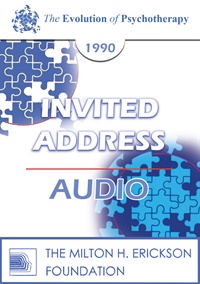
- Average Rating:
- Not yet rated
- Topic Areas:
- Invited Addresses | Schizophrenia | Children and Adolescent Therapy | Family Therapy | Psychotherapy | Relationships | Personality Disorders
- Categories:
- Evolution of Psychotherapy | Evolution of Psychotherapy 1990
- Faculty:
- Mara Selvini Palazzoli, MD | Donald Meichenbaum, PhD
- Duration:
- 1:31:23
- Format:
- Audio Only
- Original Program Date:
- Dec 14, 1990
- Short Description:
- We shall discuss one of the most frequent family processes leading to adolescent psychosis. As a direct consequence of the couple's hidden relational malaise, one of the two parents pseudo-privileges the child over the spouse and instrumentally brings him/her up as the opposite of the spouse in every way. The involuntary cheating about feelings ("imbroglio of affections") enhances the possibility of a psychotic breakdown.
- Price:
- $15.00 - Base Price
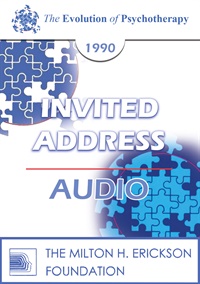
- Average Rating:
- Not yet rated
- Topic Areas:
- Invited Addresses | Consciousness | Psychotherapy | Relationships
- Categories:
- Evolution of Psychotherapy | Evolution of Psychotherapy 1990
- Faculty:
- James Hillman, PhD | Alexander Lowen, MD
- Duration:
- 1 Hour 30 Minutes
- Format:
- Audio Only
- Original Program Date:
- Dec 15, 1990
- Short Description:
- Psyche has been located wholly intrapersonally (within the individual} or interpersonally (between persons, families, groups}, but never is it conceived also extra-personally as a component of the world, as a world soul or anima mundi in the classical sense.
- Price:
- $15.00 - Base Price
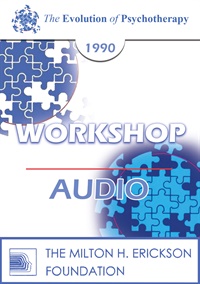
- Average Rating:
- Not yet rated
- Topic Areas:
- Workshops | Rational Emotive Behavior Therapy (REBT) | Psychotherapy | Relationships
- Categories:
- Evolution of Psychotherapy | Evolution of Psychotherapy 1990
- Faculty:
- Albert Ellis, PhD
- Duration:
- 2 Hours 31 Minutes
- Format:
- Audio Only
- Original Program Date:
- Dec 15, 1990
- Short Description:
- This workshop will present cognitive, experiential, and behavioral techniques for helping men and women to realize more of their human potential. There will be special emphasis on personal and work-related male/female relationships and on how to deal with negative reactions to "out of role'' behavior, such as women's assertiveness and men's expressions of intimacy. Live demonstrations will be offered.
- Price:
- $15.00 - Base Price
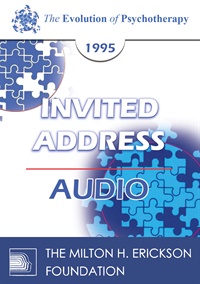
- Average Rating:
- Not yet rated
- Topic Areas:
- Invited Addresses | Family Therapy | Psychotherapy | Relationships
- Categories:
- Evolution of Psychotherapy | Evolution of Psychotherapy 1995
- Faculty:
- Cloe Madanes, HDL, LIC | James Bugental, PhD
- Course Levels:
- Master Degree or Higher in Health-Related Field
- Duration:
- 1:27:24
- Format:
- Audio Only
- Original Program Date:
- Dec 13, 1995
- Short Description:
- Madanes will present guidelines for the positive use of shame in couples and families. Stories from therapy will be told to reveal complicated problems in which shame, sex, power and love are interconnected. Looking at extreme cases of violence will throw light on when it is appropriate to experience shame and how to recover from the pain that shame represents.
- Price:
- $15.00 - Base Price

- Average Rating:
- Not yet rated
- Topic Areas:
- Topical Panels | Psychotherapy | Relationships | Therapeutic Relationship
- Categories:
- Evolution of Psychotherapy | Evolution of Psychotherapy 1995
- Faculty:
- James Bugental, PhD | Arnold Lazarus, Ph.D. | Miriam Polster | Lenore Walker, EdD
- Course Levels:
- Master Degree or Higher in Health-Related Field
- Duration:
- 1:04:24
- Format:
- Audio Only
- Original Program Date:
- Dec 15, 1995
- Short Description:
- Panel 06 - Patient / Therapist Relationship Featuring James F.T. Bugental, Ph.D.; Arnold A. Lazarus, Ph.D.; Miriam Polster, Ph.D.; and Lenore Walker, Ed.D. Moderated by W Michael Munion, MA.
- Price:
- $15.00 - Base Price
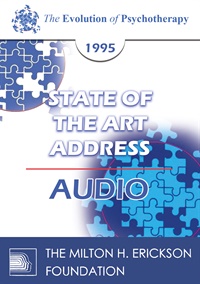
- Average Rating:
- Not yet rated
- Topic Areas:
- State of the Art Address | Psychotherapy | Relationships
- Categories:
- Evolution of Psychotherapy | Evolution of Psychotherapy 1995
- Faculty:
- Lynn Hoffman, ACSW
- Duration:
- 54 Minutes
- Format:
- Audio Only
- Original Program Date:
- Dec 13, 1995
- Short Description:
- This talk proposes to separate psychotherapy approaches into two groups: one called the "psychological therapies," focused on the growth and development of the individual psyche, and the other, the "social therapies," which deal with broader issues of relationship and the social web. My aim is to create a freer field for dialogue between two points of view that are historically independent from each other and that derive from a different conceptual base.
- Price:
- $15.00 - Base Price
Tags: Psychotherapy Relationships
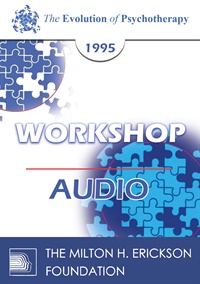
- Average Rating:
- Not yet rated
- Topic Areas:
- Workshops | Rational Emotive Behavior Therapy (REBT) | Intimacy | Psychotherapy | Relationships
- Categories:
- Evolution of Psychotherapy | Evolution of Psychotherapy 1995
- Faculty:
- Albert Ellis, PhD
- Duration:
- 2 Hours 44 Minutes
- Format:
- Audio Only
- Original Program Date:
- Dec 16, 1995
- Short Description:
- This workshop will present cognitive experiential and behavioral techniques to help women and men in their intimate relationships. There will be a special emphasis on personal and work-related male/female relationships and how to deal with negative reactions to "out of role" behavior, such as women's assertiveness and men's expressions of intimacy. Live demonstrations will be offered.
- Price:
- $15.00 - Base Price
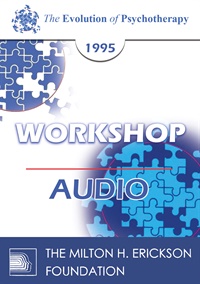
- Average Rating:
- Not yet rated
- Topic Areas:
- Workshops | Couples Therapy | Psychotherapy | Relationships
- Categories:
- Evolution of Psychotherapy | Evolution of Psychotherapy 1995
- Faculty:
- William Glasser, MD
- Duration:
- 2 Hours 33 Minutes
- Format:
- Audio Only
- Original Program Date:
- Dec 16, 1995
- Short Description:
- The application of Control Theory to the problem of selecting a compatible mate and/or staying happily married to an existing mate. To do this there will be considerable interaction with the audience.
- Price:
- $15.00 - Base Price
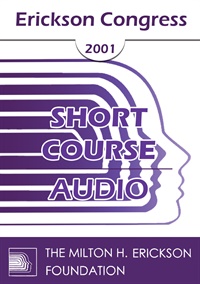
- Average Rating:
- Not yet rated
- Topic Areas:
- Short Courses | Self-Esteem | Couples Therapy | Metaphors | Ericksonian Hypnosis and Therapy Techniques | Relationships
- Categories:
- Erickson Congress 2001 | Erickson Congress
- Faculty:
- Adriana M. Barroso, Dipl. Psych
- Duration:
- 1:24:33
- Format:
- Audio Only
- Original Program Date:
- Dec 06, 2001
- Short Description:
- The various aspects that contribute to low self-esteem in young women having a difficult relationship with their partner are helped with two Ericksonian techniques - - metaphors and symbolization. These aspects include healing emotional wounds, remaining at peace with their partner, learning to love themselves, working with social beliefs, limiting ideas and cultural prejudices and being responsible for their own well-being.
- Price:
- $15.00 - Base Price

- Average Rating:
- Not yet rated
- Topic Areas:
- Workshops | Relationships
- Categories:
- Erickson Congress 2001 | Erickson Congress
- Faculty:
- Dan Short, PhD
- Duration:
- 2:06:10
- Format:
- Audio Only
- Original Program Date:
- Dec 08, 2001
- Short Description:
- IC01 Workshop 27 - The Need For Connection: Building Relationships That Are Therapeutic - Dan Short, PhD Therapeutic rapport is prerequisite not only to hypnosis but also to most forms of intervention. In this workshop, participants will learn strategies not commonly taught, such as how to develop a sincere interest in the well-being of clients whom you initially dislike, how to recognize and respond to the strength/fragility of the client's ego and when to use confrontation as a method of building trust and mutual respect.
- Price:
- $15.00 - Base Price
Please wait ...

